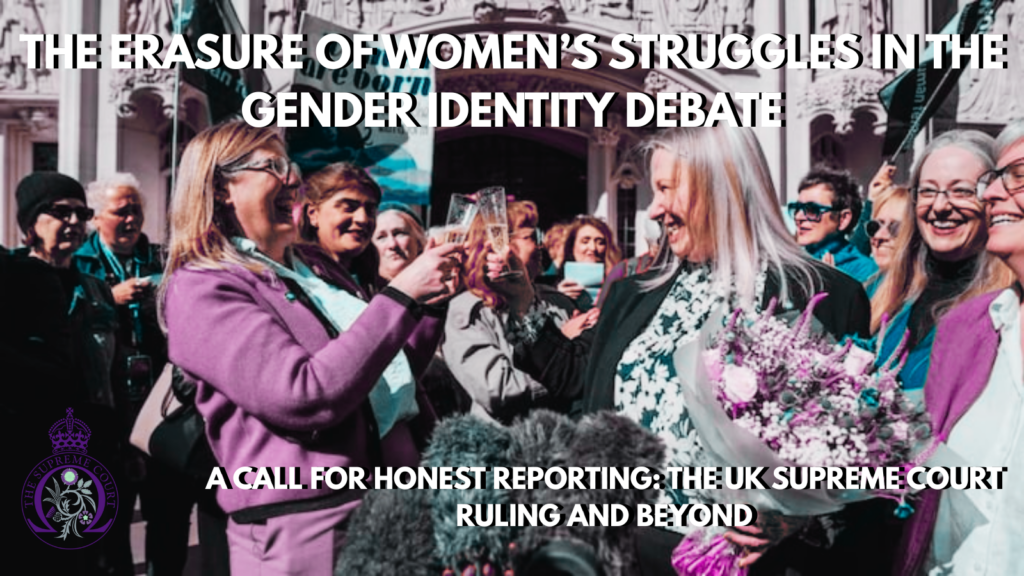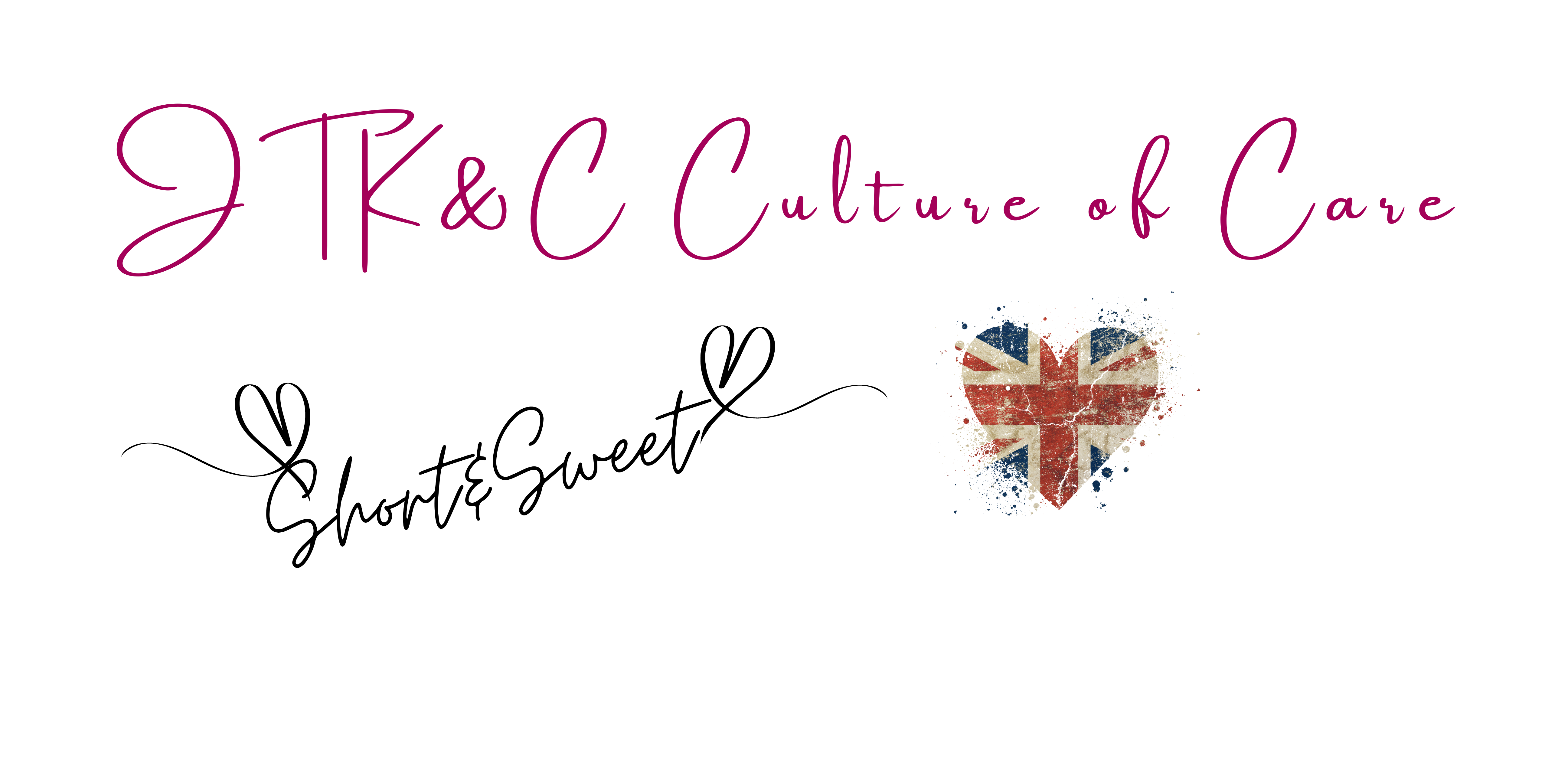
A Call for Honest Reporting: The UK Supreme Court Ruling and Beyond
The debate over the legal definition of “woman” as “adult human female” has sparked intense controversy, culminating in significant Supreme Court cases like United States v. Skrmetti (2024) and on April 16th, 2025, the UK Supreme Court delivered a landmark ruling in For Women Scotland Ltd v The Scottish Ministers, unanimously declaring that the legal definition of “woman” under the Equality Act 2010 refers to biological sex—someone born female—excluding transgender women, even those with Gender Recognition Certificates (GRCs). This decision clarified that single-sex spaces, such as refuges, hospital wards, and sports, can lawfully exclude trans women, reinforcing protections for biological women. Yet, amidst this pivotal moment, a critical perspective remains overlooked: the experiences of women who have faced job loss, financial ruin, harassment, and vilification for defending the biological definition of womanhood. Media coverage has disproportionately focused on men who identify as transgender, often framing their struggles as the primary concern while warning of a “slippery slope” toward discrimination against ethnic minorities and gay people—a narrative that lacks evidence and sidesteps the real harm faced by women. This article examines the UK ruling, Trump’s executive orders on sex, the silenced struggles of gender-critical women, and the need for honest reporting.
The UK Supreme Court Ruling: A Victory for Biological Reality
In For Women Scotland Ltd v The Scottish Ministers, the UK Supreme Court unanimously ruled that “woman” and “sex” in the Equality Act 2010 refer to biological sex. The UK Supreme Court’s decision resolved a long-standing dispute initiated by For Women Scotland (FWS), a gender-critical group backed by J.K. Rowling and lesbian rights organisations. The case challenged Scottish government guidance accompanying a 2018 law aimed at increasing female representation on public boards, which included trans women with GRCs as legally female. FWS argued this undermined sex-based protections under the Equality Act.
Susan Smith, co-director of FWS, celebrated the ruling, stating, “Women are protected by their biological sex. Sex is real, and women can now feel safe that services and spaces designated for women are for women.” The UK government welcomed the clarity, noting its implications for hospitals, refuges, and sports clubs. However, trans rights groups like Scottish Trans expressed shock, arguing the ruling reversed 20 years of legal recognition for trans people with GRCs
Trump’s Executive Orders: Reinforcing Sex as Binary
In 2025, President Donald Trump issued executive orders reinforcing that “sex” in federal law and policy refers to biological sex—male or female—based on immutable characteristics at birth. These orders, part of his administration’s agenda, aimed to clarify Title IX and other regulations, prioritising biological definitions in areas like education, sports, and healthcare. For example, one order mandated that federal agencies interpret “sex” in Title IX as excluding gender identity, ensuring women’s sports and facilities remain single-sex. Supporters, including gender-critical groups, praised the move for protecting women’s rights, while critics argued it marginalised transgender individuals. The orders echoed the UK ruling’s emphasis on biological reality but sparked heated debate in the US, often overshadowing women’s sacrifices in the gender debate.
The Silenced Struggles of UK Women
Women who have publicly asserted that “woman” means “adult human female” have faced severe repercussions. High-profile cases include:
- J.K. Rowling: The renowned author faced global backlash for her statements on biological sex, leading to professional ostracism, threats, and attempts to “cancel” her work. Despite her wealth, the emotional and professional toll was significant.
- Maya Forstater: A British researcher who lost her job at a think tank after expressing gender-critical views. Her case led to a landmark UK employment tribunal, which initially ruled her views “not worthy of respect” before being overturned on appeal. Forstater spent thousands in legal fees to win an appeal, establishing that her views were protected under UK law.
- Allison Bailey: A barrister who faced discrimination from her chambers and Stonewall for her gender-critical stance, incurring significant legal costs and professional isolation.
- Connie Shaw: the 20 year-old Leeds University undergraduate suspended from hosting a student radio show after expressing gender-critical views.
- Other women include: SNP MP Joanna Cherry Professor Kathleen Stock, Author Gillian Philip, Social worker, Rachel Meade and these are just the tip of the iceberg, not all of them were successful in their cases and many men have also been cancelled for supporting women and opposing gender ideology!
These women, among countless others, have endured harassment campaigns, doxing, and threats of violence. Social media platforms like X have documented thousands of accounts targeting gender-critical women with abuse, often without moderation. For example, a nurse (Sandy Peggie) at NHS Fife was suspended for objecting to a man in a female changing room, as were over 26 nurses in Darlington, for the same reason – highlighting the real-world consequences of speaking out.
Yet, mainstream media rarely highlights their plight, focusing instead on the narrative of transgender discrimination. This has been noticeable again, since the Supreme Court’s Judgement on the Equality Act 2010.
The Legal Context: From UK to US Supreme Courts
Women advocating for the biological definition of “woman” argue that these legal shifts erode sex-based protections under Title IX and the Equal Protection Clause. Their concerns—rooted in practical issues like safety in prisons, sports, and shelters—are often dismissed as transphobic, leading to their marginalisation. The lack of media focus on these women’s sacrifices—jobs, savings, and personal safety—reflects a broader failure to engage with their arguments.
Following the UK Supreme Court ruling, in an 88-page judgment, five justices, led by Lord Hodge, ruled that “woman” and “sex” in the Equality Act refer to biological sex at birth, not acquired gender. The court emphasised that interpreting sex as “certificated” (via GRCs) would create practical difficulties for single-sex services like changing rooms, prisons, and shelters, and weaken protections for lesbians by redefining sexual orientation. For example, a trans woman with a GRC, attracted to women, could claim to be a lesbian, impacting lesbian-only spaces.
The Media’s Misplaced Focus
Rather than amplifying the voices of women who have suffered for their views, many media outlets and organisations have prioritised the experiences of men who identify as transgender. This focus is accompanied by a narrative warning that restricting transgender rights will lead to discrimination against ethnic minorities and gay people. For example, some outlets claim that bans on gender-affirming care could set a precedent for denying healthcare to other marginalised groups. However, this argument lacks historical or legal grounding. The Equal Protection Clause has long protected racial minorities and sexual orientation as distinct categories, and no credible evidence suggests that any ruling threatens these groups.
This narrative diverts attention from the real issue: the silencing of women who face tangible consequences for their views. By framing transgender rights as the linchpin of all equality, media outlets obscure the unique challenges women face in advocating for sex-based rights.
The Disappointment of Erasure
The erasure of women’s struggles in this debate is profoundly disappointing. Organisations like Stonewall, Unison and the ACLU, once champions of free speech, gay rights and workers rights now prioritise transgender advocacy over the rights of women to define their category. Media outlets, chasing clicks or ideological alignment, amplify stories of transgender discrimination while ignoring the harassment of gender-critical women. This selective reporting fuels a one-sided narrative that dismisses legitimate concerns about women’s safety and fairness, the harassment faced by gender-critical women, sharing stories of job loss and legal battles. Yet, these voices are often drowned out by louder, better-funded campaigns. The lack of balance undermines public understanding of the stakes involved.
A Call for Balanced Reporting
The media’s failure to acknowledge women who have lost jobs, spent savings, and endured vilification for defending “woman” as “adult human female” is a disservice to honest discourse. These women deserve to be heard, not erased. Likewise, the slippery-slope argument linking transgender rights to broader discrimination lacks evidence and distracts from real issues. Journalists and organisations must strive for balance, amplifying all voices—especially those of women who have paid a steep price for their convictions. Only then can we have a meaningful conversation about sex, and equality.
Conclusion
The lack of reference to women who have suffered for defending the biological definition of “woman” is a glaring omission in the gender identity debate. As Court cases shape the legal landscape, media and organisations must stop side-lining these women’s stories. The false narrative of a slippery slope to broader discrimination only muddies the waters, ignoring the real harm faced by those who dare to speak out. It’s time for a reckoning—one that centres truth, balance, and the courage of women who refuse to be silenced.
And for an enjoyable read:
It started with sausage rolls. In the lobby of a Premier Inn in Westminster, two women from Scotland — with no political or legal background – We’re bloody-minded, not bigots: the women who changed gender law https://thetimes.com/article/61b314b4-632a-4a59-be9f-81c17990fb42?shareToken=9a03e79bce009bc7122461e1b31293b7
References & Useful Links:
- BBC Allison Bailey: Barrister awarded £22,000 in discrimination case https://www.bbc.co.uk/news/uk-england-london-62294030
- BBC SNP MP Joanna Cherry says she has been ‘cancelled’ over gender views https://www.bbc.co.uk/news/uk-scotland-edinburgh-east-fife-65451979
- Free Speech Union Gender-critical student suspended from university radio after posting interview with detransitioner https://freespeechunion.org/gender-critical-student-suspended-from-university-radio-after-posting-interview-with-detransitioner/
- Gillian Philip Never Wheeshting On 8th April, as I’ve posted earlier on CrowdJustice, I had the disappointing news that the EAT had upheld the judge’s ruling in my Employment Tribunal that I was not a “worker” and therefore was ineligible to bring my main case before the Tribunal. https://substack.com/@gillianphilip/p-150962052
- NPR Supreme Court US Delivers Major Victory To LGBTQ Employees https://www.npr.org/2020/06/15/863498848/supreme-court-delivers-major-victory-to-lgbtq-employees
- Social Work News Social worker suspended for gender critical beliefs wins landmark case against Social Work England https://www.mysocialworknews.com/article/social-worker-suspended-for-gender-critical-beliefs-wins-landmark-case-against-social-work-england
- The Guardian JK Rowling’s journey from Harry Potter creator to gender-critical campaigner https://www.theguardian.com/books/2025/apr/18/jk-rowling-harry-potter-gender-critical-campaigner
- The Guardian Woman who lost job after tweeting view on biological sex awarded £100,000 https://www.theguardian.com/society/2023/jul/01/maya-forstater-woman-who-lost-job-after-tweeting-view-on-biological-sex-awarded-100000-by-tribunal
- The Trevor Project https://www.thetrevorproject.org/blog/a-landmark-transgender-discrimination-case-at-the-supreme-court/
- Williams Institute UCLA On December 4, the Supreme Court heard oral arguments in U.S. v. Skrmetti, a lawsuit challenging Tennessee’s ban on gender-affirming care for minors.https://williamsinstitute.law.ucla.edu/publications/understanding-skrmetti/
- X Accounts: @TransgenderTRH, @WomensLibFront, @JK_Rowling, @ForWomenScot
